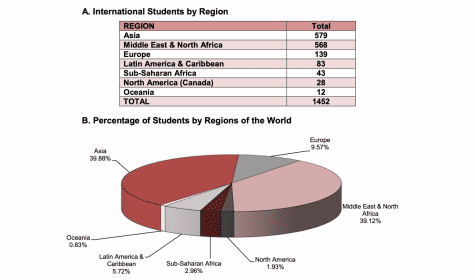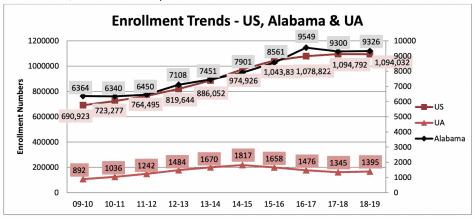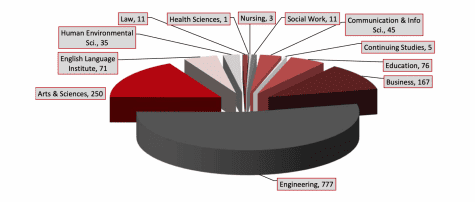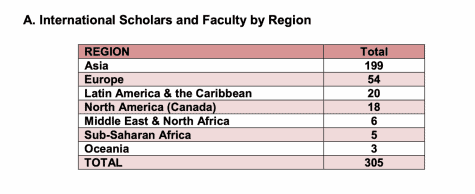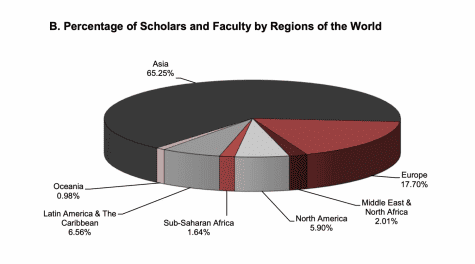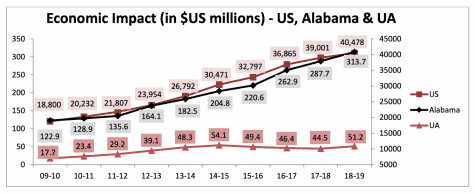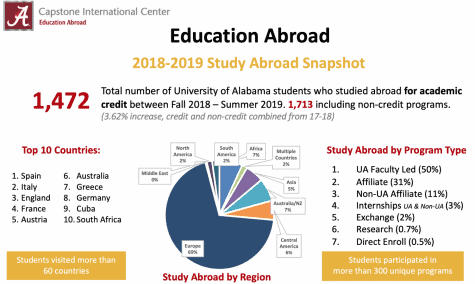Home away from home: What international students bring to UA
August 11, 2020
As the fall semester approaches, incoming students at The University of Alabama grapple with anxiety amid the pandemic and the current enrollment regulations. This is especially true for international students.
In light of the updated guidance from the Department of Homeland Security, the International Student & Scholar Services seeks to ensure incoming students at The University of Alabama maintain valid immigration status during the fall semester 2020.
Those with new initial I-20s and DS-2019s must enroll in at least one on-campus class as an in-person or hybrid course to be eligible for an F-1 or J-1 visa or to enter the United States in F-1 or J-1 status. Those on initial I-20s and DS-2019s cannot enter the U.S. and enroll fully online in fall 2020, according to an email from International Student and Scholar Services.
The International Student and Scholar Services further expounded that incoming students with new initial I-20s and DS-2019s, “may begin your degree program by enrolling in online courses for the Fall 2020 semester from your home country and arrive in-person for the Spring 2021 semester, but UA will have to change your F-1 I-20 or J-1 DS-2019 start dates.”
These changes and restrictions come during an era of globalization, in which universities are increasingly welcoming international students and faculty on their campuses. But as the pandemic continues to threaten international travel and learning, universities could face losing part of a vibrant and diverse community.
INTERNATIONAL IMPACT
As a student-centered research institution and an academic community, The University of Alabama is seeking to further establish itself as a hub of cultural diversity through a global knowledge network.
The University prides itself on being at the forefront of teaching, research and service. As an R-1 school, it provides exclusive and research opportunities for all its students. With increased enrollment in this era of globalization comes the need for a strong, talented pool of international faculty and scholars.
Last fall, international students from 78 countries and regions made up 3.81 percent of the total student population of 38,103 undergraduate, professional and graduate students. The total number of actively enrolled international students at The University of Alabama in fall 2019, including the 164 graduates on Optional Practical Training work authorization, was 1,616.
The economic impact of international students enrolled at US colleges and universities is in the millions of dollars each academic year.
In 2019, the total contribution of international students to the US economy was estimated to exceed $40 billion, factoring in college expenses, such as tuition, books, fees and other education-related expenses, not leaving out living expenses for students and their dependents. In Alabama, international students contributed $313.7 million while locally, international students at The University of Alabama made a total of $51.2 million in contribution to the wider Tuscaloosa economy.
The University of Alabama is increasingly seeking to become a strong presence in the academic landscape through a global and interconnected community.
While the University is home to over 38,000 students from a diverse number of countries, American students are also hosted by a myriad of universities and institutions around the world. The study abroad program provides UA students with study abroad experiences. Among the most popular programs are those in Spain, South Africa, Greece and England.
STEPS TOWARD INCLUSION
As the University strives to look for ways to improve the experiences and outcomes of its entire student body, each incoming freshman pledges to abide by the Capstone Creed. The Creed, which was recently revised to add the phrase “promote equity and inclusion,” is meant to reflect the values embodied in the University’s mission statement.
“As a member of the University of Alabama community, I will pursue knowledge, act with fairness, integrity and respect; promote equity and inclusion; foster individual and civic responsibility; and strive for excellence in all I do,” the Creed reads.
The University of Alabama has set its sights on fostering a welcoming culture by “providing an accepting, inclusive community that attracts and supports a diverse faculty, staff and student body” from all over the world and constantly seeking to identify and remove barriers to the success of its students by creating a fair and supportive space.
In many cases, this means providing additional resources and opportunities for international students. In times of such rapid change, here are a few ways international students can stay connected and supported while adjusting to a life on campus:
RESOURCES
The University is providing tailored support to facilitate the adjustment and acculturation of its international students, scholars, faculty and staff. A pre-arrival checklist and a health resource guide is available to ensure a seamless and anxiety-free transition into what will now become their new home.
Throughout the academic year, the international student population has access to a plethora of programs, activities, student organizations and clubs with an international focus. Ongoing workshops, events and cultural activities are designed to accommodate its growing foreign student body.
The University has also put in place academic support services, international student scholarships, external scholarship avenues and support programs and services to accommodate the needs of its diverse student body.
The Capstone International Center (CIC) of the University strives for “the development of a global perspective campus-wide” while providing global outreach opportunities through networking events. An array of university- and community-wide initiatives, projects, events and organizations are geared toward international and American students, scholars, faculty, staff and their families to engage in intercultural exchange and create international friendships.
International education week, a joint initiative of the U.S. Department of State and the U.S. Department of Education, seeks to “foster inter-cultural understanding and promote awareness of the diverse cultures at the University of Alabama and beyond.”
STATISTICAL DATA
Data has been collected by The University of Alabama and can be found on the 2019 International Student & Scholar Report or the 2018-2019 Study Abroad Snapshot.
